Notes: Infinitives | Basic Grammar for IELTS PDF Download
Infinitives are created by to + verb.
It is important that you can use them correctly in your IELTS speaking and writing or when you use English more generally.
Take a look at this paragraph. The infinitives are bold.
To improve my IELTS score, I joined a writing class in a college in my home town. I wanted to make sure that my grammar was as good as it could be. The teachers helped me to understand some complex grammatical points. It is impossible to know everything in a short time, but I improved lot, and I would really like to thank them for what they did. To help me like this was very kind.
All these are being used in different ways.
The Grammar
The infinitive form of the verb means that it does not take a tense. It is the bare form of the verb, but with 'to' before it.
Here are some examples
- to go
- to see
- to wait
- to manipulate
- to consider
- to amend
A common mistake in writing is to think of it like a finite verb (a verb that has a subject and takes a tense). It does not change its form.
Here is an example of a common mistake with the infinitive:
It took me five hours to reached the destination.
The person has made the infinitive verb, reach, in the past tense. Only the main verb (take in this case) can be given a tense.
This is how it should be written:
How are they used?
The table below explains some of their common uses. This is followed by some tables with examples.
1. As direct objects
When an infinitive is used as a direct object, it is placed after the verb:
- I wanted to make sure that my grammar was as good as it could be.
- I decided to study abroad, but my parents are refusing to pay.
2. To show purpose
They are sometimes used as a reduction of the phrase 'in order to'.
- In order to improve my IELTS score, I joined a writing class in a college in my home town.
- To improve my IELTS score, I joined a writing class in a college in my home town.
- I joined the exercise class in order to lose weight.
- I joined the exercise class to lose weight.
3. As a subject
- To help me like this was very kind.
- To get involved in charity work is a very noble cause.
However, note that the use of the gerund in these structures is much more common:
- 'Helping' me like this was very kind.
- 'Getting' involved in charity work is a very noble cause.
If you do see an infinitive at the beginning of a sentence, it is much more likely to be showing purpose i.e replacing in order to.
4. With phrases beginning with 'it' (it + be + infinitive)
- It is 'impossible' to be perfect in a short time.
(Adjective + Infinitive) - It could be 'a mistake' to leave my job.
(Noun + Infinitive)
5. With the verb 'take' (it + take + noun + infinitive)
- It took me five hours to reach the destination.
- It takes a lot of concentration to read this book.
6. After certain adjectives
- My brother was surprised to see me.
- I was careful not to speak too loudly.
Common Verbs before infinitives
If you wish to put two verbs together, then the second verb will need to be an infinitive and / or gerund.
For example, you can't say this:
- He hoped see me again.
- He hoped seeing me again.
If "hope" is followed by another verb, it needs to be an infinitive:
- He hoped to see me again.
Remember, certain verbs should be followed by an infinitive, not a gerund, and some verbs can be followed by either. For example:
- I like to swim (verb + infinitive)
Or - I like swimming (verb + gerund)
Here is a list of verbs that are very commonly followed by an infinitive (not a gerund):
Verbs Commonly Followed by an Infinitive
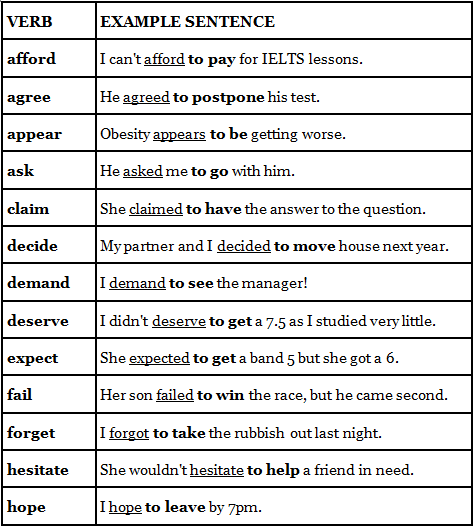
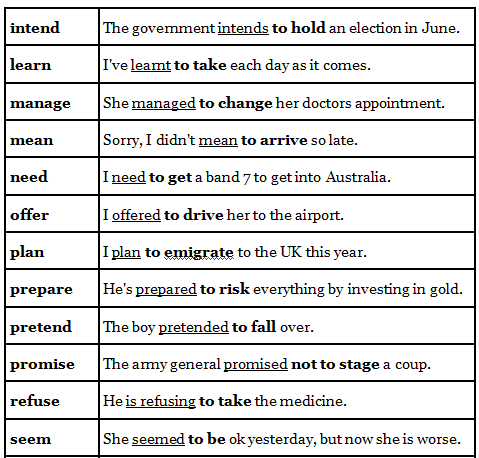
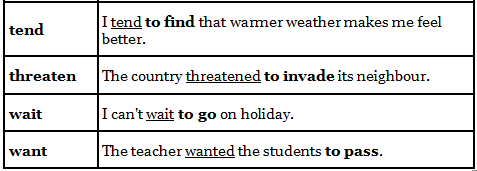
The next tables show you some common ways that adjectives and nouns are used with the infinitive.
Common adjectives preceded by it + be and followed by infinitive
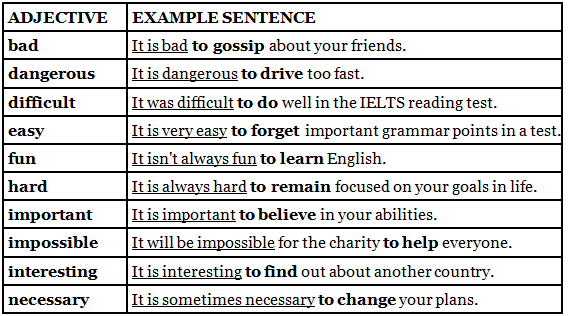
Common nouns preceded by it + be and followed by infinitive
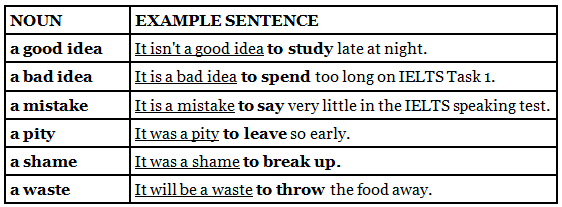
Common adjectives followed by infinitives
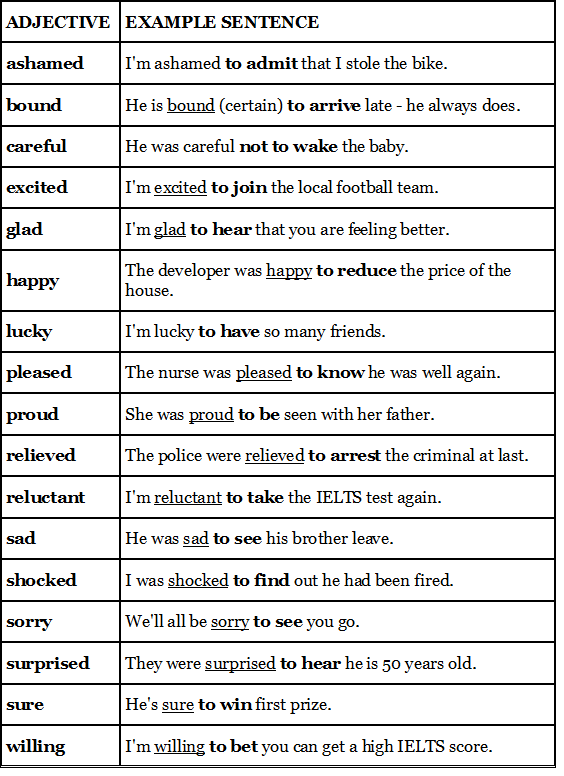
|
18 videos|54 docs
|
FAQs on Notes: Infinitives - Basic Grammar for IELTS
| 1. What are infinitives in the English language? |  |
| 2. How are infinitives used in sentences? |  |
| 3. Can infinitives be used without the word "to"? |  |
| 4. Are there any exceptions to using "to" before an infinitive? |  |
| 5. Can infinitives be used as adjectives or adverbs? |  |
















